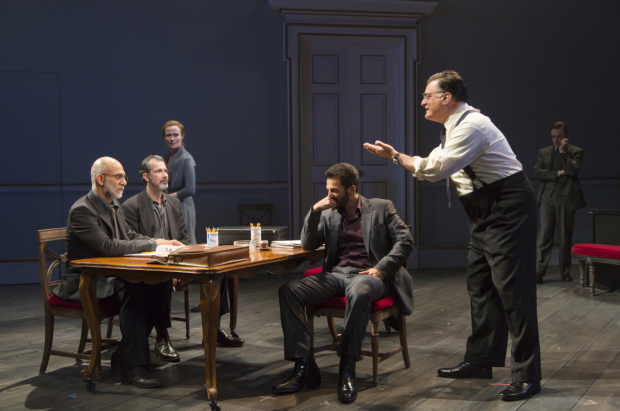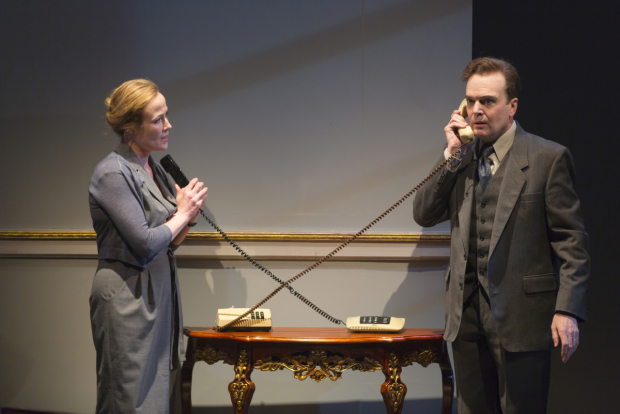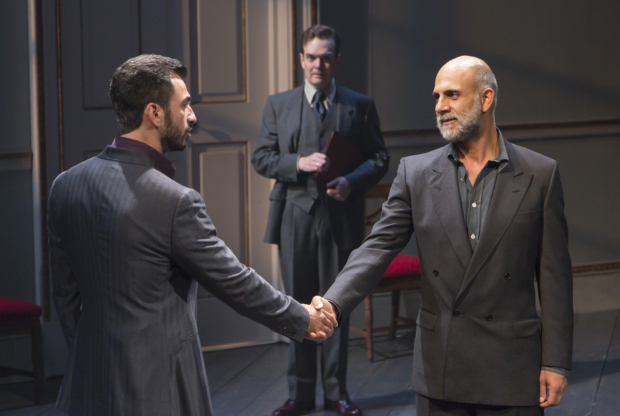Oslo

(© T. Charles Erickson)
Scotch and waffles played a huge role in the only successful peace negotiations between Israel and Palestine. At least, that is, according to J.T. Rogers in his excellent new play, Oslo. Now making its world premiere at Lincoln Center Theater's Mitzi E. Newhouse Theater, the play charts the unlikely development of the Oslo Accords, the landmark agreement that established the Palestinian Authority and paved the way for a two-state solution with Israel, an outcome that has unfortunately not yet come to fruition. Who would have thought that bilateral diplomacy could be this thrilling?
Rogers filters this massively complicated tale through the perspective of the Norwegian diplomats who helped make it possible: Terje Rød-Larsen (Jefferson Mays) and Mona Juul (Jennifer Ehle), his wife (Rogers met his subjects through director Bartlett Sher, who helms this production). Using their contacts, Larsen and Juul open a back channel of communication between the Israelis and the Tunis-based PLO in 1992. Since it is illegal for any Israeli government officials to communicate with the PLO (then deemed a terrorist organization), the Palestinian group's Finance Minister, Ahmed Qurie (Anthony Azizi), first meets with economics professor Yair Hirschfeld (Daniel Oreskes), who just happens to regularly break bread with Deputy Foreign Minister Yossi Beilin (Adam Dannheisser).

(© T. Charles Erickson)
As their talks begin to bear fruit, the Israelis upgrade their delegation to include higher-ranking negotiators like Uri Savir (Michael Aronov, convincingly embodying a boisterous Israeli macho man) and lawyer Joel Singer (an appropriately smug Joseph Siravo). Legal advice is conspicuously absent from the Palestinian side, although they do have ample old communist rhetoric from PLO liaison Hassan Asfour (the hilariously menacing Dariush Kashani). The men (and with the exception of Juul, who is just there as a facilitator, all the participants are men) wrangle over land and legitimacy by day, retiring to stuff their faces and tell stories at night. Their interactions oscillate wildly between hearty laughter and red-faced shouting matches, everything pitched up to eleven. Will this casually nontransparent Mediterranean approach to diplomacy succeed where the official Washington-sponsored talks have failed? Yes, apparently.
The pace and scale of the play — three hours of constantly shifting furniture and talking points — gives one a physical sense of just how exhausting and tenuous these negotiations really were. Using a sparsely decorated yet tastefully ovular room as his canvas, set designer Michael Yeargan employs a dizzying array of furniture to effectively create castles in Norway and cafes in Tel Aviv. Everything is on castors so that Sher and his cast can execute speedy transitions. Strife from the outside world seeps in through 59 Productions' well-curated projections, which flicker on the upstage wall like fading memories.
While Sher's production and Rogers' language draw us into the world of international diplomacy, it is the performances that hold us rapt. Mays is particularly transfixing as the seemingly mild-mannered (but potentially self-serving) Larsen. Masking his intentions with a pleasant smile and the poshest of international English accents, we can never quite tell what is more important to him: bringing peace to the Holy Land or validating his gradualist model of diplomacy. With a deadly gaze capable of penetrating concrete, Ehle's Juul simultaneously calls him on the carpet and enables his machinations. But the ends justified the means, right? By the play's conclusion, it is very clear that not even Larsen is fully convinced of that.

(© T. Charles Erickson)
Oslo is extraordinary in its ability to chart the temperature of the negotiations, but its laser-like focus misses how external political factors influenced the jockeying inside the room where it happened: how the Israeli delegation took advantage of the divisions and personal ambitions within the fractious Palestinian coalition even as they sought to mitigate the inevitable challenge from their own right wing, headed by the man who still leads Israel today, Benjamin Netanyahu. Some of that context might have helped shed light on the darker side of the Oslo Accords and how they have contributed to the present impasse.
Still, Rogers has crafted an invaluable and incredibly watchable drama about a hugely important event that far too many Americans, invested in the orthodoxy of our chosen side in this conflict, fail to fully understand. Most important: The Oslo Accords were always meant to be temporary, a five-year plan toward a more permanent settlement. Yet in the absence of that agreement (and as Mahmoud Abbas serves year 12 of his four-year term as president of the Palestinian Authority), that temporary fix appears to be the new normal. Oslo helps us to understand just how we got here.











